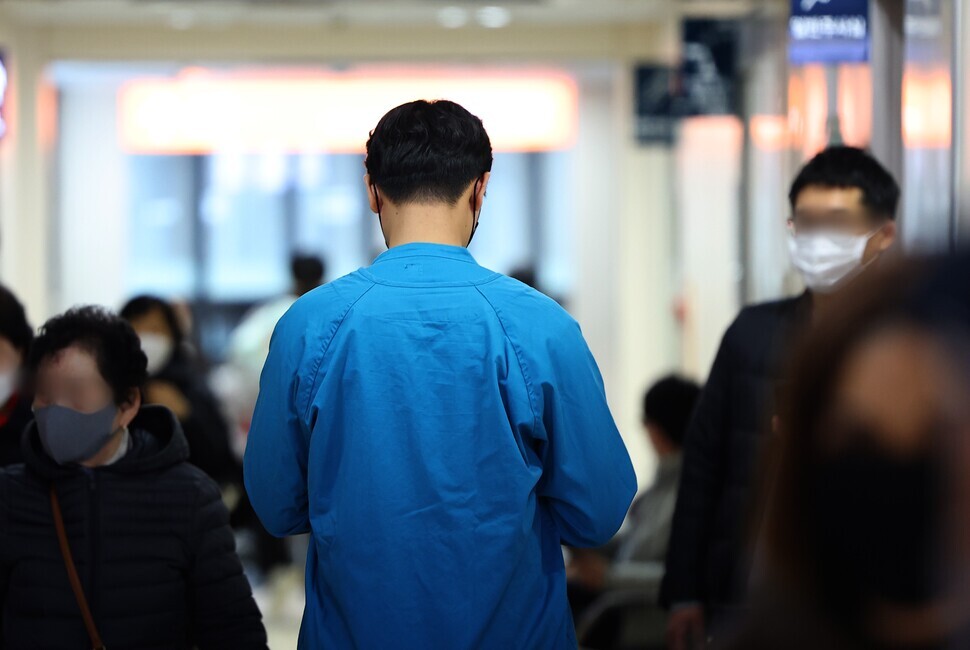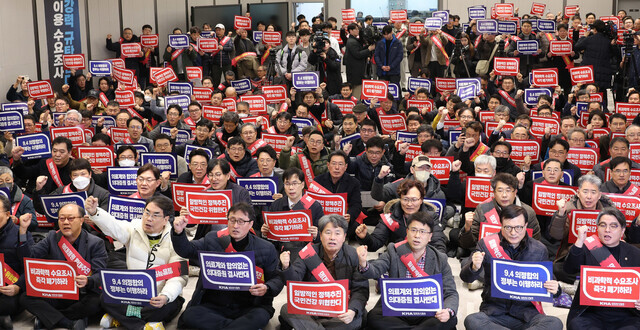hankyoreh
Links to other country sites 다른 나라 사이트 링크
Pupils before patients: Korean med school faculty mull joining trainee doctors’ collective action

With South Korea raising its healthcare crisis level to its highest rating of “severe” in response to the mass resignation of interns and residents protesting a rise in the medical college admission cap, representatives of physician groups held an emergency meeting where they asserted that the “entire medical community will use all lawful means and methods available to resist until the end if the administration unilaterally implements its policy.”
In an expanded meeting of nationwide physician representatives Sunday at the Korean Medical Association (KMA) building in Seoul’s Yongsan District, the association’s emergency leadership committee discussed possible measures to block the increase in the medical college admission ceiling.
“The aim of us 140,000 physicians” — referring to the ranks of the KMA — “is to see the administrations’ mistaken policy reexamined from square one,” said KMA emergency committee chairperson Kim Taek-woo on Sunday.
The healthcare vacuum could expand to a level that really hits home with the South Korean public if private practitioners — who make up a large portion of the KMA membership — join in the shutdown.

“Obliged to join in the interns’ and residents’ action”
Professors at some university hospitals have also hinted at potentially joining the collective action. In a position statement issued on Friday, the emergency committee of the Seoul National University medical school faculty association said that its members would be “obliged to join in the [interns’ and residents’] action if there are no acceptable measures from the administration.”
Some SNU medical school faculty members are reportedly discussing a suspension of their combined duties, where they would only continue lecturing while suspending their hospital activities.
“The proposal that doctors only teach rather than treat is limited to a small faction of hard-liners,” said Chung Jin-haeng, who heads up the SNU medical school faculty’s emergency leadership committee.
“If they truly decide to go through with it, then there’s only so much I can do as the head of the committee. The situation will have deteriorated beyond my control by that point.”
On Saturday, the faculty senate of the Yonsei University College of Medicine issued a statement declaring, “If our pupils are unduly punished, as their teachers and mentors, we will not idly stand by.”
Conversely, the Medical Professors Association of Korea issued a statement on the same day, declaring, “To fill the unavoidable gaps in medical services, we are doing our best to treat patients regardless, and will continue to do so.”
“Both the government and doctors need to work to reach a solution as quickly as possible,” the statement continued.
Moreover, a large number of residents in the third and fourth year and fellows could leave their positions as soon as their contracts end. Third and fourth-year residents typically conclude their contracts at the end of their training period. Residents are expected to leave their positions at the end of February. Fellows typically renew their contracts before they expire, but many are expected to not renew their contracts in protest of the government’s policy.
By Kim Yoon-ju, staff reporter; Lim Jae-hee, staff reporter
Please direct questions or comments to [english@hani.co.kr]

Editorial・opinion
![[Column] Will Seoul’s ties with Moscow really recover on their own? [Column] Will Seoul’s ties with Moscow really recover on their own?](https://flexible.img.hani.co.kr/flexible/normal/500/300/imgdb/original/2024/0513/5917155871573919.jpg) [Column] Will Seoul’s ties with Moscow really recover on their own?
[Column] Will Seoul’s ties with Moscow really recover on their own?![[Column] Samsung’s ‘lost decade’ and Lee Jae-yong’s mismatched chopsticks [Column] Samsung’s ‘lost decade’ and Lee Jae-yong’s mismatched chopsticks](https://flexible.img.hani.co.kr/flexible/normal/500/300/imgdb/original/2024/0512/3017154788490114.jpg) [Column] Samsung’s ‘lost decade’ and Lee Jae-yong’s mismatched chopsticks
[Column] Samsung’s ‘lost decade’ and Lee Jae-yong’s mismatched chopsticks- [Correspondent’s column] The real reason the US is worried about Chinese ‘overcapacity’
- [Editorial] Yoon’s gesture at communication only highlights his reluctance to change
- [Editorial] Perilous stakes of Trump’s rhetoric around US troop pullout from Korea
- [Guest essay] Preventing Korean Peninsula from becoming front line of new cold war
- [Column] The state is back — but is it in business?
- [Column] Life on our Trisolaris
- [Editorial] Penalties for airing allegations against Korea’s first lady endanger free press
- [Editorial] Yoon must halt procurement of SM-3 interceptor missiles
Most viewed articles
- 1[Column] Samsung’s ‘lost decade’ and Lee Jae-yong’s mismatched chopsticks
- 2Ado over Line stokes anti-Japanese sentiment in Korea, discontent among Naver employees
- 3US has always pulled troops from Korea unilaterally — is Yoon prepared for it to happen again?
- 4Korean opposition decries Line affair as price of Yoon’s ‘degrading’ diplomacy toward Japan
- 5‘Free Palestine!’: Anti-war protest wave comes to Korean campuses
- 6[Photo] Korean students protest US complicity in Israel’s war outside US Embassy
- 7[Column] Will Seoul’s ties with Moscow really recover on their own?
- 8Shuttering all foreign worker support centers, S. Korea leaves migrants to fend for themselves
- 9Korean auto industry on edge after US hints at ban on Chinese tech in connected cars
- 10Korean med schools swallow bitter pill by pushing back classes to avoid mass flunking